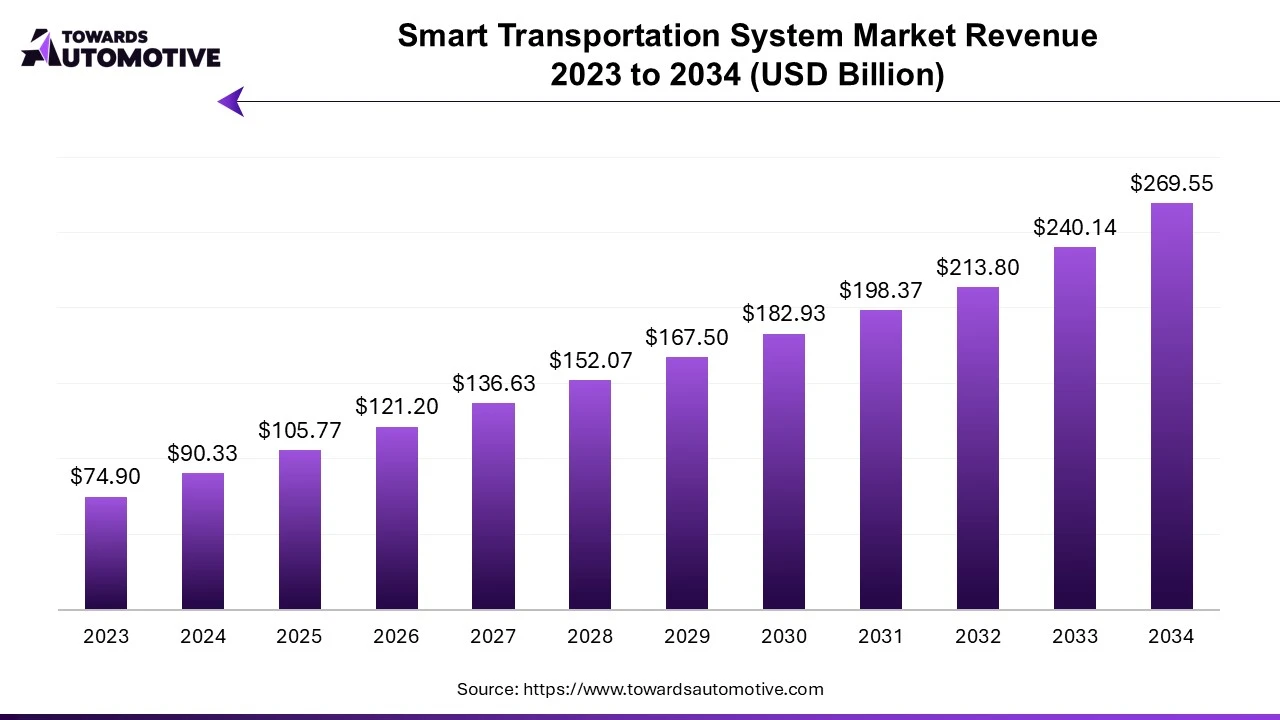Artificial Intelligence (AI) is revolutionizing the smart transportation market by driving improvements in efficiency, safety, and sustainability. The global smart transportation market is projected to grow significantly, with its size estimated at USD 90.33 billion in 2024 and expected to reach USD 269.55 billion by 2034, expanding at a compound annual growth rate (CAGR) of 12.36% over the next decade. This growth is closely tied to AI technologies being integrated into various aspects of transportation systems, enhancing traffic management, autonomous driving, public transit optimization, and logistics. Here’s an exploration of how AI is transforming the landscape of smart transportation:

Get All the Details in Our Solution – Download Brochure @ https://www.towardsautomotive.com/download-brochure/1149
Optimizing Traffic Flow
One of the most significant contributions AI makes to smart transportation is optimizing traffic flow. By analyzing real-time data from sensors, cameras, and GPS devices, AI algorithms can predict traffic patterns and adjust traffic signals accordingly. This dynamic adjustment helps reduce congestion, minimize travel times, and improve overall traffic conditions. AI continuously processes vast amounts of traffic data to ensure smoother transitions through intersections and improved traffic management throughout the day.
Enhancing Safety through Predictive Analytics
AI’s predictive analytics capabilities are invaluable in the transportation sector. By leveraging historical data along with real-time inputs, AI can forecast traffic patterns, identify peak congestion times, and even predict potential accidents. This allows transportation agencies to take proactive measures such as adjusting routes or signals, minimizing congestion, and preventing accidents before they occur. Additionally, AI enhances safety by monitoring traffic conditions and swiftly identifying any irregularities or dangerous driving behavior.
Autonomous Vehicles: The Backbone of Smart Transportation
AI plays a crucial role in the development of autonomous vehicles (AVs), which are quickly becoming an integral part of smart transportation. AI algorithms process data from sensors, cameras, and other devices to enable vehicles to perceive their surroundings, make decisions, and navigate safely without human intervention. The real-time processing capabilities of AI ensure that autonomous vehicles can respond to dynamic traffic conditions, obstacles, and road changes, contributing to both safety and efficiency in transportation.
Optimizing Public Transit Systems
Public transportation systems also benefit from AI integration. By analyzing ridership data, AI can optimize routes, schedules, and service frequencies to improve efficiency and reduce waiting times for passengers. This AI-powered optimization helps increase the attractiveness of public transit, encouraging more people to rely on buses, trains, and other modes of public transport. The integration of AI also enhances operational efficiency, allowing transportation agencies to respond more effectively to changing demand patterns.
Seamless Integration of Transportation Modes
AI enables the seamless integration of various transportation modes, such as buses, trains, and ridesharing services, into a single platform. This integration makes it easier for users to plan and pay for their entire journey, from home to their destination, using a single app or platform. AI algorithms help determine the most efficient travel options based on real-time traffic conditions, user preferences, and the availability of services. This creates a more cohesive and user-friendly experience, encouraging the use of multiple modes of transportation.
Improved Emergency Response
AI’s ability to detect and analyze road incidents in real-time is a game-changer for emergency response times. By analyzing traffic data and monitoring for unusual patterns or behaviors, AI systems can identify accidents, traffic collisions, or other safety hazards, alerting emergency services more quickly. This leads to faster responses, minimizing the impact of accidents and improving overall road safety.
Enhancing Logistics and Fleet Efficiency
AI also plays a significant role in the logistics and delivery sector, optimizing routes and improving fleet management. By analyzing traffic patterns, vehicle performance, and fuel consumption, AI can suggest more efficient routes, reducing fuel use and emissions. Additionally, AI can help optimize delivery schedules, ensuring that goods are delivered on time while minimizing the environmental impact of transportation.
AI-Based Smart Transportation Solutions
In May 2023, DFI launched an AI-based smart transportation solution aimed at enhancing safety and building sustainable cities. The solution integrates AI technologies to address traffic management, safety concerns, and environmental sustainability, marking a significant step forward in the development of smart transportation systems.
Invest in Our Premium Strategic Solution @ https://www.towardsautomotive.com/price/1149
You can place an order or ask any questions, please feel free to contact us at sales@towardsautomotive.com
Explore the comprehensive statistics and insights on automotive industry data and its associated segmentation: Get a Subscription
For Latest Update Follow Us: https://www.linkedin.com/company/towards-automotive
